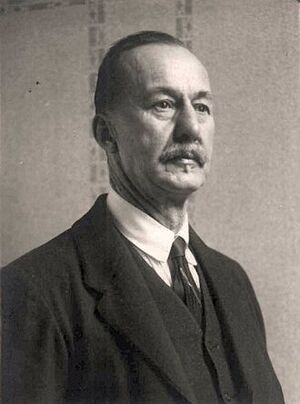Wilhelm Wirtinger (nonfiction): Difference between revisions
No edit summary |
No edit summary |
||
| (One intermediate revision by the same user not shown) | |||
| Line 1: | Line 1: | ||
[[File:Wilhelm_Wirtinger.jpg|thumb|Wilhelm Wirtinger.]]'''Wilhelm Wirtinger''' (15 July 1865 – 15 January 1945) was an Austrian [[Mathematician (nonfiction)|mathematician]], working in [[Complex analysis (nonfiction)|complex analysis]], [[Geometry (nonfiction)|geometry]], [[Algebra (nonfiction)|algebra, [[Number theory (nonfiction)|number theory]], Lie groups, and knot theory. | [[File:Wilhelm_Wirtinger.jpg|thumb|Wilhelm Wirtinger.]]'''Wilhelm Wirtinger''' (15 July 1865 – 15 January 1945) was an Austrian [[Mathematician (nonfiction)|mathematician]], working in [[Complex analysis (nonfiction)|complex analysis]], [[Geometry (nonfiction)|geometry]], [[Algebra (nonfiction)|algebra]], [[Number theory (nonfiction)|number theory]], [[Lie group (nonfiction)|Lie groups]], and [[Knot theory (nonfiction)|knot theory]]. | ||
Wirtinger was greatly influenced by [[Felix Klein (nonfiction)|Felix Klein]] with whom he studied at the University of Berlin and the University of Göttingen. | Wirtinger was greatly influenced by [[Felix Klein (nonfiction)|Felix Klein]] with whom he studied at the University of Berlin and the University of Göttingen. | ||
| Line 34: | Line 34: | ||
* [[Geometry (nonfiction)]] | * [[Geometry (nonfiction)]] | ||
* [[Felix Klein (nonfiction)]] - influence | * [[Felix Klein (nonfiction)]] - influence | ||
* [[Knot theory (nonfiction)]] | |||
* [[Lie group (nonfiction)]] | |||
* [[Mathematician (nonfiction)]] | * [[Mathematician (nonfiction)]] | ||
* [[Mathematics (nonfiction)]] | * [[Mathematics (nonfiction)]] | ||
| Line 40: | Line 42: | ||
* [[Emil Weyr (nonfiction)]] - Doctoral advisor | * [[Emil Weyr (nonfiction)]] - Doctoral advisor | ||
External links | == External links == | ||
* [https://en.wikipedia.org/wiki/Wilhelm_Wirtinger Wilhelm Wirtinger] @ Wikipedia | * [https://en.wikipedia.org/wiki/Wilhelm_Wirtinger Wilhelm Wirtinger] @ Wikipedia | ||
[[Category:Nonfiction (nonfiction)]] | [[Category:Nonfiction (nonfiction)]] | ||
{{Template:Categories: July 15}} | |||
{{Template:Categories: 1865}} | |||
{{Template:Categories: January 15}} | |||
{{Template:Categories: 1945}} | |||
[[Category:Algebraists (nonfiction)]] | [[Category:Algebraists (nonfiction)]] | ||
[[Category:Geometers (nonfiction)]] | [[Category:Geometers (nonfiction)]] | ||
| Line 52: | Line 60: | ||
[[Category:Number theorists (nonfiction)]] | [[Category:Number theorists (nonfiction)]] | ||
[[Category:People (nonfiction)]] | [[Category:People (nonfiction)]] | ||
[[Category:Photographs (nonfiction)]] | |||
[[Category:Portraits (nonfiction)]] | |||
[[Category:Wilhelm Wirtinger (nonfiction)]] | |||
Latest revision as of 06:01, 8 June 2024
Wilhelm Wirtinger (15 July 1865 – 15 January 1945) was an Austrian mathematician, working in complex analysis, geometry, algebra, number theory, Lie groups, and knot theory.
Wirtinger was greatly influenced by Felix Klein with whom he studied at the University of Berlin and the University of Göttingen.
In 1907 the Royal Society of London awarded him the Sylvester Medal, for his contributions to the general theory of functions.
He worked in many areas of mathematics, publishing 71 works.
His first significant work, published in 1896, was on theta functions.
He proposed as a generalization of eigenvalues, the concept of the spectrum of an operator, in an 1897 paper; the concept was further extended by David Hilbert and now it forms the main object of investigation in the field of spectral theory.
Wirtinger also contributed papers on complex analysis, geometry, algebra, number theory, and Lie groups.
He collaborated with Kurt Reidemeister on knot theory, showing in 1905 how to compute the knot group.
In the News
Fiction cross-reference
Nonfiction cross-reference
- Algebra (nonfiction)
- Complex analysis (nonfiction)
- Geometry (nonfiction)
- Felix Klein (nonfiction) - influence
- Knot theory (nonfiction)
- Lie group (nonfiction)
- Mathematician (nonfiction)
- Mathematics (nonfiction)
- Number theory (nonfiction)
- Gustav Ritter von Escherich (nonfiction) - Doctoral advisor
- Emil Weyr (nonfiction) - Doctoral advisor
External links
- Wilhelm Wirtinger @ Wikipedia
- Nonfiction (nonfiction)
- July (nonfiction)
- July 15 (nonfiction)
- 1860s (nonfiction)
- 1865 (nonfiction)
- January (nonfiction)
- January 15 (nonfiction)
- 1940s (nonfiction)
- 1945 (nonfiction)
- Algebraists (nonfiction)
- Geometers (nonfiction)
- Group theorists (nonfiction)
- Mathematical analysts (nonfiction)
- Mathematicians (nonfiction)
- Number theorists (nonfiction)
- People (nonfiction)
- Photographs (nonfiction)
- Portraits (nonfiction)
- Wilhelm Wirtinger (nonfiction)
